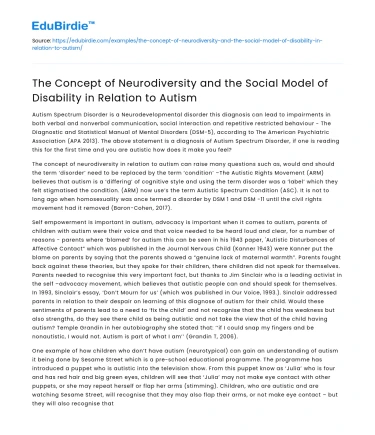A heated conversation erupted at last year's disability rights conference in London when Sarah, an autistic self-advocate, challenged a prominent researcher about his stance on autism interventions. This exchange perfectly captures the ongoing tension between two prominent perspectives shaping our understanding of autism today. While some view autism primarily through a medical lens that emphasizes challenges and support needs, others champion a revolutionary view of autism as simply a different - and valuable - way of experiencing the world.
Changing Perspectives
In the 1940s, when Leo Kanner first described autism, the condition was seen purely as a disorder to be treated. Parents faced harsh blame, and autistic individuals were often institutionalized. This dark history still casts shadows today. However, the landscape has transformed dramatically since then, largely due to autistic individuals themselves speaking up and challenging traditional views.
Take Jamie, a software engineer in Seattle, who explains: "I'm not broken or diseased. My brain just works differently. Those differences come with challenges, yes, but also with strengths." His perspective reflects a growing movement that sees autism as a natural variation in human neurology rather than something to be cured.
Save your time!
We can take care of your essay
- Proper editing and formatting
- Free revision, title page, and bibliography
- Flexible prices and money-back guarantee
Supporting Needs
Yet we cannot ignore the very real challenges many autistic people face. Maria, a mother of two autistic children, shares her daily reality: "My son needs constant support with basic tasks, while my daughter is highly independent but struggles with sensory overload in public spaces. Both deserve understanding and appropriate help." Their experiences highlight why many families and professionals emphasize the importance of recognizing autism's disabling aspects.
Some autistic individuals require substantial support throughout their lives with communication, self-care, and daily living skills. Others may need specific accommodations to thrive in work or educational settings. Dismissing these challenges in favor of a purely celebratory view risks leaving many without crucial support services.
Finding Balance
Recent research from the University of California suggests that these seemingly opposing viewpoints might actually complement each other. Dr. Rodriguez's team found that approaches combining acceptance of neurodiversity with appropriate support services led to better outcomes than either approach alone.
Consider the success story of Central High School in Portland. After adopting a dual framework that both celebrates neurodiversity and provides robust support services, they saw dramatic improvements in autistic students' academic performance and social engagement. Their autism program coordinator notes, "We stopped trying to make our autistic students conform to neurotypical standards. Instead, we created an environment that values their unique perspectives while giving them tools to navigate challenging aspects of school life."
Moving Forward
The path ahead requires nuanced thinking. We must acknowledge both the intrinsic value of neurological differences and the genuine challenges many autistic individuals face. This means:
- Challenging harmful stereotypes while recognizing diverse support needs
- Celebrating autistic perspectives while providing necessary accommodations
- Reforming systems while maintaining crucial services
- Supporting independence while ensuring adequate assistance
Looking ahead, we need research that examines autism through multiple lenses. We need policies that protect rights while ensuring support. Most importantly, we need to listen to diverse autistic voices - from those who need minimal support to those with more intensive needs.
Real Solutions
Practical steps are already emerging. The Autism Alliance Network has pioneered a "both-and" approach in their workplace integration program. They pair job skill training with sensory-friendly office spaces and flexible work arrangements. Their success rate in sustainable employment placement has doubled since adopting this balanced perspective.
Similarly, the Growing Minds elementary school program combines traditional support services with a neurodiversity-affirming curriculum. Teachers report improved outcomes across all metrics - from academic achievement to social engagement. As one teacher shares, "When we stopped trying to force our autistic students into a one-size-fits-all model and instead embraced their differences while providing targeted support, everything changed."
Another groundbreaking initiative comes from the Spectrum Innovation Hub in Toronto. They've developed a unique mentorship program where autistic adults guide younger individuals through life transitions. What makes their approach special is how they match mentors and mentees based on shared interests and communication styles, not just support needs. Program director Alex Chen reports, "Our success comes from recognizing that support can look different for everyone. Sometimes the best help comes from someone who naturally speaks your language."
Looking Ahead
The future of autism understanding lies not in choosing sides but in thoughtful integration of different perspectives. We must create spaces where autistic individuals can thrive as themselves while accessing needed support. This means moving beyond simple categorizations toward nuanced understanding.
Returning to that conference exchange in London - by the end of the discussion, both the researcher and the self-advocate found common ground. They agreed that respecting neurodiversity and providing support aren't mutually exclusive. Rather, they represent complementary paths toward the same goal: enabling autistic individuals to live fulfilling lives on their own terms.
As we move forward, let's carry this wisdom: acceptance and support can - and should - go hand in hand. The real challenge lies not in choosing between perspectives, but in thoughtfully integrating them to create a world that truly works for all autistic individuals.
This integration requires ongoing dialogue between all stakeholders - autistic individuals, families, professionals, and researchers. We must continue developing innovative approaches that honor both individual differences and support needs. Only through this balanced perspective can we create truly inclusive communities where all autistic individuals have the opportunity to thrive.






 Stuck on your essay?
Stuck on your essay?

